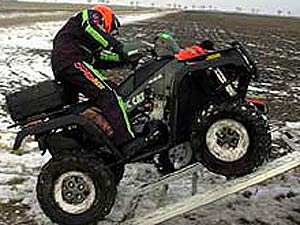 |
| ATV riders would like longer, interconnected trails in and around the Superior National Forest. (MPR File Photo) |
Duluth, Minn. — Mickey Brazell lives just outside Grand Marais. He's president of the Cook County ATV club. But he doesn't even own an all-terrain vehicle.
"I'd like to," he says. "If I was allowed to ride legally from my house maybe over on the back roads over to Pike Lake and then go visit my friends, I'd love to do that."
Brazell says there are a lot of trails in Cook County, but they're mostly short logging roads and they don't connect to each other. He'd like to be able to ride a couple of hours before having to load his ATV back in the truck.
He says some people are already traveling long distances, but they're riding illegally on regular roads in order to get from one place to another.
Dennis Neitzke recognizes the problem. Neitzke manages the Gunflint District of the Superior National Forest. He says there are about 400 miles of logging roads and trails ATVers can use in the Cook County part of the forest alone.
And he says it should be relatively easy to connect those trails for longer trips.
"Working with the state and the county, and the band, I think there's some pretty neat opportunities out there without building another foot of trail," Neitzke says.
In addition to the Superior National Forest, the Grand Portage Band of Chippewa, the Minnesota DNR, and Cook County are all trying to find ways to link up trails. They have to work together, because the forest is like a confusing patchwork quilt, with federal, state, county, and tribal land interconnected.
At the DNR, Craig Engwall is in charge of the planning. He says it's going to be tricky for riders to know the rules as they travel from one jurisdiction to another, because the national rules can be different from the state rules.
"In all national forests, there's no off-trail travel. There's no exception for big-game retrieval or anything like that," Engwall says. "Whereas on state land, if you're hunting big game, you can go off trail for certain specified reasons."
Engwall says it's going to be a big job to educate riders about those distinctions.
Critics of motorized recreation will be at the meetings to defend their hiking and skiing trails against any proposals to share them with ATVs and snowmobiles.
Clyde Hanson is a volunteer with the Sierra Club who lives near Lutsen. He says the idea of multi-use trails combining hiking and all-terrain vehicles is ridiculous.
"I don't even want -- as a pedestrian -- to share a trail with such a machine," he says. "It just don't feel safe; some teenager is going to come up ripping up behind me and blow me over. Not to mention the noise, and the smell, and the anger, knowing what those machines are doing to the land, just ruins the experience for me."
Hanson says even when riders stick to the trail, they compact the soil and pollute the air. And he says too many of them jump off the trail and cause even more damage to wildlife habitat.
He's also suspicious of proposals for a longer, interconnected trail system. He says short trails, or short loops, are the best way to catch ATVers who break the law.
"If there's a connector trail system and you know you're getting busted for damaging some wetlands or something, you can disappear in the trail system and come out 30 miles away, get on your cellphone, and have your friends come and pick you up," he says. "There's just no way that law enforcement can track you down."
But Dennis Neitzke, from the Forest Service, points to his experience in Michigan and says he doesn't expect much of an enforcement problem.
"We went through this, and then signed all the roads whether open or closed, and once we did that, people were pretty good about it," Neitzke says. "I mean they were just looking to ride an ATV, either to a location, or as a family out for a family ride."
Both the Forest Service and the DNR hope to have a plan ready for public review by this summer.





